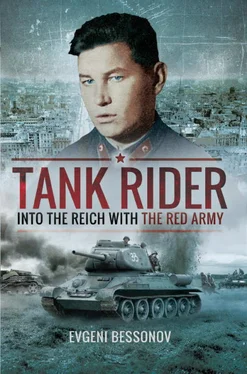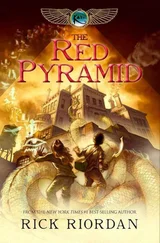We arrived at the concentration area after several days. We stayed for some five days in a copse, waiting for further orders. After this, on one summer evening, Studebakers drove up to us, all personnel of the battalion climbed aboard those trucks and we moved closer to the front by a forced march. The problem was that the drivers did not have sufficient driving experience, and sometimes made mistakes when advancing in columns, but all worked out well. In the morning we dismounted from the trucks and dispersed in the forest in case of artillery strike.
At dawn on 14 July, 1944, after an extensive artillery barrage and numerous air strikes, the infantry’s offensive operation began; the goal was to break through the strongly fortified German defences. On 17 July, after breaking through the German positions, our 4th Tank Army entered the gap with the mission to penetrate deep into the enemy’s rear in the direction of Lvov. Only our 1st motor rifle battalion was thrown into the breakthrough, we rode on tanks of the 56th Tank Regiment. The second and the third battalions along with the Brigade’s tank regiment in the meantime attacked the Germans, who tried to close the gap in their defences, counter-attacking from north and south. The battalions suffered significant losses in personnel and tanks in a heated battle; the tank regiment of the Brigade was almost completely wiped out. However, the enemy also suffered losses and had to give up its intention to close the gap in defences. As a result of that battle, our battalion, our Brigade and the 6th Mechanized Corps in general had all the conditions necessary for a raid into the enemy’s rear. Thus, the burden of fighting during the raid fell on our battalion, the only one that had not suffered losses in the first days of the operation.
We were hit hard during the march to Lvov, especially by the German air force, which never stopped strafing our column, trying to slow down our advance. We tried to advance at night, but summer nights were short and we had to advance in daytime as well. The enemy tried to stop us with all the means at his disposal, setting ambushes and covering forces, but it did not help him much, and we continued our march forward. We also suffered from heat, especially when we dismounted tanks and had to march on foot because of the air raids. What was an air raid? Normally 20 or 25 Junkers bomber planes, escorted by Messerschmitt 109 or 110 fighters, flew in. The bombers were in battle formation even before they reached us and strafed along our column, or attacked from the side, normally out of the sun. First they all dropped their bombs, aiming for the tanks and simultaneously fired the large-calibre machine-guns, trying to set them on fire. The planes attacked twice or three times. During an air raid the tank riders would immediately jump from the tanks like lemmings, trying to run away from the road, diving into some natural shelter, or just lie down and wait for the raid to be over. The tanks also left the road. On a hot sunny day, just beyond the town of Zolochev, the German air force bombed the battalion’s column all day long, ‘with no lunch break’, as we said: one group would leave, and the next one would arrive right away. That was why the tanks stopped and the Brigade’s command, with the consent of the battalion commander, ordered the tank riders to march on foot with all possible camouflage and concealment. In daytime the heat exhausted the soldiers, there were problems with water, men lost their energy and our feet seemed to be made of lead. Some soldiers chafed their feet sore to bleeding. I also got sore feet, for the first and last time in my life. Tanks stood in shelters till darkness and then caught up with us; during the night the battalion again marched ahead on tanks. This measure helped us to avoid losses in personnel and tanks, and we reached the necessary point after the night march. The enemy temporarily lost us; the German air force searched forest edges and ravines, but it was in vain. We marched to Lvov in this manner for several days more.
I liked to sit on the front armour of the tank, on the machine-gun mounting (on the right side of the tank), holding on to the main gun barrel with my left hand. However, one could really only do this when the nights were quite light, with good weather and a good road; normally the tank riders would stay behind the tank turret. Just one time I was inside the tank – I had an hour’s nap there. It was not too comfortable – bumpy, hot and strange. I mostly travelled on the first tank – there was no dust and there was a good view. However, the danger was that the very first enemy’s shell was for you – after all, that was the first vehicle. This is exactly what happened once.
We had travelled on tanks almost the whole night, with lights on. Before dawn, as the sky grew grey, the column stopped in front of a small hill for a short break. That was in front of small town Bobrka, south of Lvov. I decided to leave the first tank and stay behind the turret of the third tank – a more usual place for me and my soldiers. I just wanted to take a nap, if that was possible. Apparently, my intuition helped me, not for the first time. As soon as the column moved forward and the first tank reached the top of the hill, the Fritzes opened fire, the first tank was knocked out and caught fire and then exploded. Two or three soldiers who were on that tank died, the rest, some eight of them, survived. The men were lucky, they jumped off the tank in time, ran away from it and took cover in a roadside ditch. The company also dismounted the tanks and dispersed in a line. We lay down and started to dig in just in case. We could not lift our heads, so heavy was the German machine-gun fire, artillery also fired on us (later we learned that this was in fact German tanks – Panthers).
The order ‘Forward!’ came from the company commander. I got my platoon up to attack, other platoons of the company also stood up. We reached the top of the hill, where our knocked-out tank was, and could not advance any further because of the storm of fire coming from the Fritzes. The platoon suffered casualties – both dead and wounded. The soldiers went to ground, as they could not stand the machine-gun and artillery fire of the enemy, as well as the sniper fire. With the assistance of the squad leaders I managed to spot a couple of German machine-gun nests that were dug-in some 150 to 200 metres from our line. I pointed them out to a runner and sent him to an artillery observer and to the battalion’s mortar company; by that time they themselves had already seen the targets. Brigade artillery and our 82 mm mortars opened fire but failed to suppress the German gun emplacements. As soon as we got up from the ground, the Fritzes pinned us down again; the Brigade’s command did not send tanks to support us, apparently sparing them for further battles. We, tank riders, also could not attack without tank support, and we lay down and tried to wait for the tanks to arrive.
Another ‘Forward!’ order came, that time with the addition of ‘or you will be executed.’ I think that it was the company commander himself, Nikolai Chernyshov, who thought up this addition. I very much doubt that the battalion or brigade commander would have come up with such an order; I never heard anything like that from them either in this and or in the following battles. No one ever scared me with threats of execution, there were no reasons to do so, I always followed my orders without question. We would have to attack the Fritzes and die for the sake of others’ lives. However, it took us a long time to organize the attack, almost the entire day. Yes, we were afraid to charge against tanks, we were simply afraid. The company did not have anti-tank weapons (anti-tank grenades, petrol bombs, were already becoming obsolete). It was not only me who was afraid, other company commanders and platoon leaders were also afraid. The enemy’s fire was heavy and deadly, no one wanted to die, regardless of how brave or dashing you were. The worst thing is to become a cripple, it is better to die right away. When you attack and feel that your comrades are falling next to you, you are horrified – ‘It must be me next.’ But on the other hand, one had such a huge anger against the Germans: ‘just wait for me to get there’, that one was ready to crush everything around and no longer thought of death.
Читать дальше












